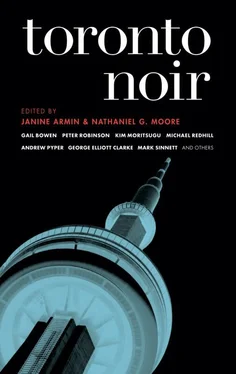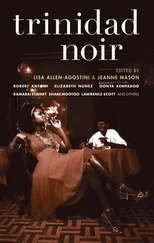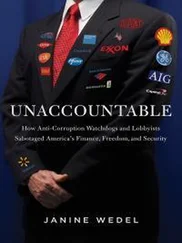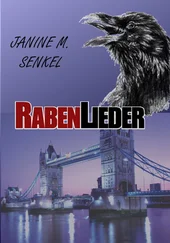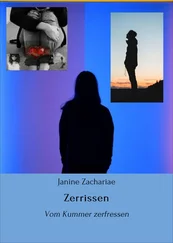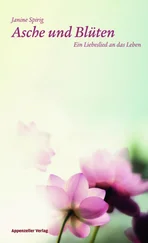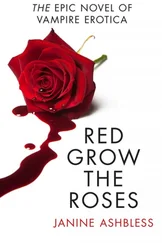“Doesn’t mattah,” Persaud said, shaking his head forcefully. “You is Indian. Like me. I was born in Guyana. Never been to India.” His accent seemed to be thickening as the evening progressed. But Meera had no trouble following. His gravitas commanded complete focus and understanding. “Never been to India,” he said again. “Don’t know m’caste or m’daddy’s caste. But I is a pandit just the same. One priest of God!”
Meera reflected, was tempted to smile. Her own father, whom this man so wished to resemble, had hated religion. He had refused to raise his children with religion, had thrown his wife’s idols from the home, and had famously quipped, “When things go well, we thank the gods. But when things go to hell, we blame everybody but the gods! What bullshit is this?” Yet in the end, even he had asked for a priest.
“You were a pandit in Guyana?” she asked him.
“Yes,” Persaud said. His face darkened and his eyes deepened. The sounds of the street seemed to retreat then, isolating Meera alone with the old man, cushioned from Yanni, the window, and the rest of the world. “I is a pandit now, and I was a pandit then.” He paused and stared at her meaningfully. “I was a pandit of Kali.” He spat the last word.
Again Meera smiled. “I didn’t know Kali was so popular outside India.”
“Kali be another face of the same God,” Persaud said, screwing up his own wizened face in mock dismissal of her seeming ignorance. “Goddess of blood, she. Goddess of glorious bittah red wine that pump in we veins. She scare the white people, na. But we know: She be a mama just like any lady. We respect Mama. We respect Daddy. And when you is a slave or servant in the cane fields of Guyana — back when the white man tek all you history, all you possessions, all you beliefs, and give you Jesus Christ instead — when you is a slave or a servant, you need cling to you mama and you daddy with greater force!” His gaze intensified, as did his hold on Meera’s hand. “Because dat is all you got, in the end. Dat is all you got.”
It was then that Meera noticed Yanni was being uncharacteristically quiet. She looked to him and saw only his back, with his untucked plaid shirt whipping in the wind from the window. “Yanni,” she asked, “are you all right?”
“He’s just staring up at me,” Yanni replied. He continued to look down into the mêlée below, red and yellow flashing sirens reflecting off his expressionless face.
“Yahhhm,” Persaud intoned. “Tell dis old man, please, boy. How the god of death look? He tall? He old or he young? How black is he face? When he come, I not go see he. He go tek m’soul and I not go see he face.”
Yanni replied without intonation, only fact. “He’s about twenty-one, five foot eight, but quite heavyset, wearing a white-and-blue University of Toronto jacket. And he’s blond... and white.” Persaud jerked at the last. “Maybe he’s just catatonic. Or in shock. All he does is stare up at me; at this window. Maybe he needs a doctor.”
Meera squeezed Persaud’s hand, then stood up. “Yanni,” she said, “it’s time we went to work. Let’s send for a wheelchair to take Mr. Persaud back to Palliative, then you and I had better report to Emergency. You think?”
Yanni detached himself from the window and scratched his head. “Sure, M. Let’s go.”
“Wait!” Persaud bellowed. “Listen! All me need is ten minute. Just listen a m’story fo’ ten minute, then you can do what the hell you want fo’ do. Yahhhm go come before ten minute. Just listen a m’story, na. I got fo’ tell somebody before me dead, or Kali go cuss m’soul.” He stared at the two of them for a good long couple of heartbeats. “You want she fo’ cuss m’soul? No? Good. Come listen, na.”
Yanni made an odd dismissive noise and returned to his post by the window, voyeuristically surveying the crowd. Sheepishly, Meera moved back to Persaud’s side, an imploring look in her eyes. “Okay,” she said. “Tell me. But then we have to take you back to your own room.”
And Manoj Persaud launched into his tale...
It was years before Guyana had obtained its political independence from Britain. The decades that had passed of slavery for the blacks, of near genocide for the natives, and of indentured service for the Indians had bred a thirst for release from the chains of colonial rule. With each layer of Europeanness painted atop this weather-beaten Asian and African tapestry came a strengthening of its foreign matte, a calling for connections to lives and philosophies left centuries and fathoms away. African animism, sporadic puddles of voodoo, the naturalistic magics of the scattered native tribes, and the myriad faiths smuggled from India all found fertile soil in this wet chasm of discontent. Amongst the Indian immigrants, the cult of Kali was revived and flourished.
In the telling of the tale, Persaud gurgled and his words took on a distant tenor. “Goddess Kali,” he whispered. “Omnipotent power absolute. She be the origin of cosmos and spirit. Deity of time, eternity and source of all energies. Kali bless us and we triumph over evil, destroy rogues and knaves, expel inauspicious souls, and repel demons.” He focused on Meera again, slowly intoning, “She be knowledge. She be bliss.”
Meera felt the dying man’s pulse again, worried for his stress. She opened her mouth to speak, but Persaud covered it with his quivering hand. “Let me finish, na. You got fo’ undahstand. The white man, he afeared o’ Kali. He think she be demonic, wit’ blood and scariness. But dat is fo’ he. Kali is we mama. She be the female face of God, the angry mama who does protect she pickney, she children. We is she children. It is — what you say? — a metaphor. We weak before the white man, so we need one strong image of we mama fo’ protection. You see?”
Meera nodded. And Persaud continued his narration...
Manoj Persaud had been a priest at the temple of Kali, where scores of devotees came weekly, sometimes daily, to offer obeisance to the mother goddess. In exchange, they received stable employment, healthy children, enough food to last the month, or whatever else it was they prayed for. It was Persaud who interpreted the omens and prodigies, who interceded between mortals and goddess. It was Persaud who interpreted the lost ways of obscure India to the subcontinent’s forgotten and wretched Caribbean progency.
But tensions were mounting as demands for political independence grew louder on the streets, in the newspapers, the rum shops, and even within the temples. “And one day,” Persaud said, “dem came fo’ talk wit’ me.” Six men they were, regular devotees of Kali, some even Persaud’s relatives. They abased themselves before the priest and asked for a special puja , a divine way or ceremony, for Kali to guarantee and accelerate Guyana’s impending independence.
“I tell dem fo’ pray and fo’ make sacrifice to Kali, like dem always do, wit’ coins, food, and fasting,” Persaud said, a sense of both sadness and horror growing behind his eyes. “But dem say dem want something extra. Something more. Fo’ Kali. Fo’ big big magic.”
The younger Persaud had watched his devotees with growing unease, as the full extent of their petition came to be understood. For a boon of this magnitude, one affecting a whole nation of people, the old ways would have required a human sacrifice. But modern times employed modern methods, with pumpkins standing in for human heads; or the use of human effigies constructed of flour and mud, slashed with razor-sharp machetes. Persaud presented these tamer options to his petitioners.
“But dem know the magic,” he said with growing weariness. “Dem know the sacrifice, how the sacrifice must be aware. It must know it own fate and not be acting to stop the cutlass.” Only then would the magic work, when the ultimate unseemly price had been paid. Only then would Kali grant them their wish.
Читать дальше
